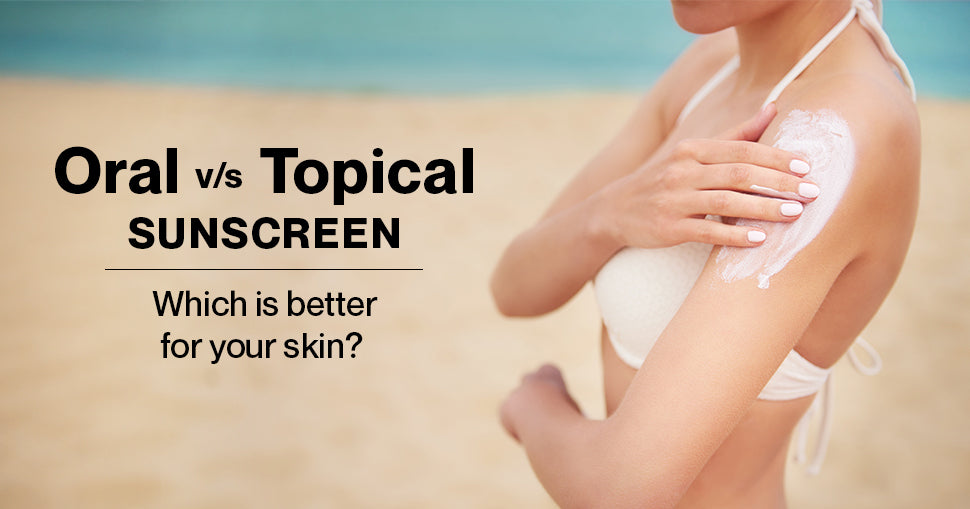Oral Sunscreen vs. Topical Sunscreen: Which is Better for Your Skin?
13 Nov 2024
When it comes to protecting our skin from the sun, many people are familiar with topical sunscreen, but oral sunscreen is emerging as a new contender in the world of sun protection. With promises to protect skin from the inside out, oral sunscreen is gaining attention for its unique approach. But how do these two methods compare? In this blog, we’ll break down the differences, benefits, and limitations of both oral and topical sunscreens, helping you make an informed choice on what’s best for your skin.
Understanding Sunscreen: Topical vs. Oral
Sunscreen is designed to protect your skin from harmful UV (ultraviolet) radiation, which can cause sunburn, skin damage, and increase the risk of skin cancer. **Topical sunscreens** are the traditional form, applied directly to the skin to act as a physical or chemical barrier against UV rays. **Oral sunscreens**, on the other hand, come in the form of supplements or beverages that claim to boost the skin’s natural defense mechanisms against UV radiation from within.
So, let’s dive into each type of sunscreen to understand how they work and their respective benefits.
How Does Topical Sunscreen Work?
Topical sunscreen is applied to the skin’s surface and acts as a barrier that blocks or absorbs UV rays before they penetrate deeper layers of the skin. There are two main types of topical sunscreens: chemical sunscreens and physical (mineral) sunscreens.
- Chemical Sunscreens: These contain active ingredients like avobenzone, oxybenzone, and octinoxate, which absorb UV rays, convert them into heat, and release the heat from the skin. Chemical sunscreens often feel lightweight and are easy to blend in without leaving a visible residue.
- Physical (Mineral) Sunscreens: These use natural minerals like zinc oxide and titanium dioxide, which sit on top of the skin and reflect UV rays away. Physical sunscreens tend to be gentler on sensitive skin and offer immediate protection upon application, although they can sometimes leave a white cast on the skin.
Advantages of Topical Sunscreen
- Direct UV Protection: Topical sunscreens provide a clear, measurable level of protection (SPF rating) against both UVA and UVB rays.
- Immediate Effectiveness: Physical sunscreens protect instantly, while chemical sunscreens require about 15-20 minutes to activate.
- Customizable: You can find sunscreens with various SPFs, making it easier to adjust to different sun exposure needs.
- Water-Resistant Options: Many formulations are water-resistant, ideal for swimming or sweating.
Limitations of Topical Sunscreen:
- Reapplication Required: Sunscreen must be reapplied every 2 hours for continuous protection, especially after swimming or sweating.
- May Cause Skin Sensitivity: Some people react to certain chemical ingredients, causing irritation.
- Less Convenient: Regular reapplication can be inconvenient, particularly with makeup or for people with active lifestyles.
How Does Oral Sunscreen Work?
Oral sunscreen works differently. Instead of providing an external barrier, it uses ingredients that support the skin’s natural defenses from the inside. Oral sunscreens typically contain antioxidants, carotenoids, and other compounds that help fortify the skin's ability to counteract UV damage. Some common ingredients include Polypodium leucotomos (a tropical fern extract), astaxanthin, beta-carotene, lycopene, and Nutroxsun (a Mediterranean blend of rosemary and grapefruit extracts).
When you take these ingredients as supplements, they accumulate in your skin over time, strengthening it against the oxidative stress caused by sun exposure. This approach aims to reduce cellular damage from within, potentially lowering inflammation and the risk of sunburn or photoaging (sun-induced aging).
Advantages of Oral Sunscreen
- Antioxidant Support: Oral sunscreens contain antioxidants that help neutralize free radicals caused by UV radiation, which can otherwise damage skin cells.
- Reduces Inflammation: Some ingredients have anti-inflammatory properties that can help reduce skin redness or swelling from sun exposure.
- Long-Term Skin Health: Consistent intake of oral sunscreens may improve skin resilience, supporting healthier skin that ages more gracefully.
- Convenient: Unlike topical sunscreen, oral sunscreen doesn’t need reapplication, which can be beneficial for those with busy or active lifestyles.
Limitations of Oral Sunscreen
- Not a Replacement for Topical Sunscreen: Oral sunscreen doesn’t provide the same direct protection as SPF-rated topical sunscreen and should only be used as a supplementary measure.
- Takes Time to Build Up: Oral sunscreens typically need several weeks of consistent use to build up in the system, so it’s not a quick fix.
- Varied Effectiveness: The degree of protection can vary based on the ingredients and individual response, and it generally does not match the SPF power of topical sunscreens.
Oral Sunscreen Benefits: What Does the Research Say?
The benefits of oral sunscreen are still being researched, but certain studies suggest that specific ingredients can offer mild protection and anti-aging benefits. Here are some of the key benefits of oral sunscreen based on current findings:
- Enhanced Skin Resilience: Ingredients like astaxanthin have been shown to increase the skin’s resistance to sunburn, reducing the risk of redness and sensitivity from sun exposure.
- Protection Against Oxidative Stress: Sun exposure increases the production of free radicals, which can damage the skin’s collagen and elastin. Oral sunscreen ingredients, particularly antioxidants, work to neutralize these free radicals, helping protect skin cells from damage that leads to wrinkles and sagging.
- Reduced Inflammation: Ingredients like Nutroxsun have anti-inflammatory properties that may reduce the inflammatory response from sun exposure. This could mean less redness and irritation, especially for sensitive skin types.
- Anti-Aging Effects: Over time, sun exposure can lead to premature aging, including wrinkles, fine lines, and hyperpigmentation. Oral sunscreens may help slow down these processes, offering a long-term benefit for maintaining youthful-looking skin.
Is Oral Sunscreen Good for Everyone?
While oral sunscreen has benefits, it’s essential to remember that it should be viewed as a supplement to, not a replacement for, topical sunscreen. The primary goal of oral sunscreen is to support the skin’s resilience from within, but it does not offer the same level of protection against UVB rays, which are primarily responsible for sunburn.
Oral sunscreen may be particularly beneficial for:
- People with Active Lifestyles: For those who are outdoors often or have difficulty reapplying topical sunscreen regularly, oral sunscreen can provide added support.
- People with Sensitive Skin: Those who experience skin irritation from topical sunscreens may find oral sunscreen a gentler option for added UV defense.
- Anti-Aging Enthusiasts: If you’re focused on long-term skin health, oral sunscreen’s antioxidant and anti-aging properties can complement your skincare routine.
Comparing Effectiveness: Oral Sunscreen vs. Topical Sunscreen
When comparing oral sunscreen to topical sunscreen, it’s clear that each has unique benefits and limitations. Let’s break down a few key areas:
- Sun Protection Factor (SPF): Topical sunscreens provide a quantifiable SPF rating, indicating the level of protection against UVB rays. Oral sunscreens, on the other hand, do not have an SPF rating, making them less reliable for direct protection against sunburn.
- Protection from UVA vs. UVB Rays: While topical sunscreens protect against both UVA (aging) and UVB (burning) rays, oral sunscreens primarily offer protection against UVA rays by enhancing the skin's resilience against oxidative stress. Therefore, oral sunscreens are better suited for long-term skin health rather than immediate sunburn prevention.
- Ease of Use: Oral sunscreens don’t require reapplication and are easier to incorporate into daily routines, particularly for those who struggle with regular sunscreen use. However, topical sunscreens offer immediate, proven protection, and their reapplication, while less convenient, is crucial for ongoing effectiveness.
- Overall Skin Health: Oral sunscreens are excellent for supporting skin health at a cellular level, particularly for anti-aging and maintaining skin elasticity and hydration. Topical sunscreens are essential for day-to-day protection and preventing sunburn and immediate damage from sun exposure.
The Bottom Line: Which is Better?
Ultimately, the best approach is not to choose between oral and topical sunscreen, but to consider them complementary. For the highest level of sun protection and long-term skin health, use both. Topical sunscreen remains the primary line of defense, protecting the skin from direct UV exposure with reliable SPF protection. Oral sunscreen, on the other hand, can provide added support from within, enhancing skin resilience and potentially slowing down the effects of aging caused by the sun.
A Balanced Approach to Sun Protection
- Use Topical Sunscreen Daily: Apply a broad-spectrum sunscreen with at least SPF 30 every day, and reapply every two hours if you’re outside or swimming.
- Consider Oral Sunscreen as a Supplement: If you’re interested in added benefits for skin health and anti-aging, consider incorporating an oral sunscreen supplement as part of your routine.
- Practice Additional Sun Safety: Wear protective clothing, seek shade, and avoid sun exposure during peak hours for a comprehensive approach to sun protection.
Conclusion
In the debate of oral sunscreen vs. topical sunscreen, each has a distinct role in a well-rounded sun protection strategy. While oral sunscreen offers benefits for long-term skin health, it should be viewed as a supplement rather than a substitute for topical sunscreen. By combining these approaches, you can maximize your skin’s defense against the harmful effects of UV rays and keep your skin healthier for years to come.
Categories
- Choosing a selection results in a full page refresh.
- Press the space key then arrow keys to make a selection.
this is the sidecart
















